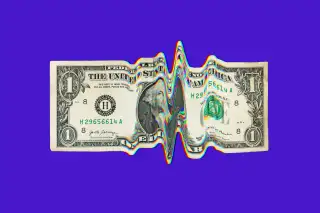The Dollar Is Heading for Its Worst Month Since 2011. Here's Why That's Good for Your Investments

The U.S. dollar is not having a good summer. Down around 9% from its March highs, the greenback looks like it’s on its way to having its worst month in nearly a decade.
Sure, that might be bad if you were thinking of booking a vacation abroad, but it could actually be a good thing for your investment portfolio.
First off, why is the dollar weakening? The currency was strong for a while, then the pandemic hit and the Fed cut short-term interest rates to near zero. Low U.S. interest rates tend to weaken the demand for the U.S. dollar as large investors move money abroad to chase higher-yielding assets denominated in foreign currencies.
The dollar managed buck this trend in March. Then investors were willing to overlook lower interest rates in exchange for the dollar's perceived safety as global stock and bond markets seized up amid economic panic over coronavirus lockdowns.
Since then, the market has calmed down, yet U.S. interest rates remain at historic lows. In the past several weeks that dynamic has begun a steep toll on the dollar's value.
What a Weak Dollar Means for U.S. Stocks
Now, on to that good news we promised. A weaker dollar means that American products are cheaper abroad, giving U.S. companies that sell to foreign countries more competitive prices. (A simple example: If you produced something in the U.S. and are selling it for $1, when you go to the United Kingdom, maybe it’s now selling for 95 cents. Why wouldn’t someone buy at that price?) And you likely have those companies that will benefit already in your portfolio — in 2018, the percentage of S&P 500 sales from foreign countries was 43%, according to S&P Global.
Of course, this will impact some companies more than others. Technology companies might gain the most since they have a lot of international exposure while utilities and some traditional telecom companies (like AT&T and Verizon) may benefit the least due to U.S.-focused businesses, says Howard Silverblatt, senior index analyst at S&P Dow Jones Indices.
And because of the pandemic, it’s not so much a matter of how much something costs, but also where you can get it. As Asia is opening up and producing more, for example, U.S. multinationals that round out many Americans' investment portfolios may be able to acquire the supplies they need abroad while other smaller companies could have more trouble re-stocking, Silverblatt adds.
What a Weak Dollar Means for Foreign Stocks
Also, a weak dollar can lift your foreign investments, says John Stoltzfus, chief investment strategist at Oppenheimer Asset Management. When a stock rises in local currency or pays a dividend that investment gain ultimately gets translated into dollars for U.S. investors. The weaker the U.S. dollar, the more dollars those same local currency gains will buy in your investment account, Stoltzfus explains.
For example, the MSCI EAFE Index, a widely followed benchmark of developed markets stocks, has gained 7.9% in local currencies in the past three months through Tuesday. Those gains amount to 13% when translated into dollars.
The Dollar's Outlook
So where does the dollar go from here? It looks like it will depend in large part on the ability of the U.S. to control the spread of the coronavirus. If the virus begins to spread widely and there is a need for more prolonged lockdowns, we could see another rise in the dollar as investors flee risky assets in favor of safety, says Jon Burckett-St. Laurent, senior portfolio manager at Exencial Wealth Advisors.
But the Fed has said it plans to keep interest rates low, and it appears that more stimulus from the government is coming. An increase in the amount of money the government “prints” could contribute to more weakness for the U.S. dollar, he adds.
More from Money:
The Simple Reason Investors Are Going Nuts for Gold Right Now
Investing During Coronavirus: How to Win by Focusing on the Losers
Elon Musk May Have Just Tweeted His Way Into Your Index Fund